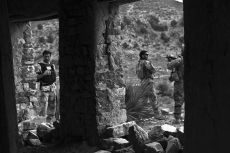The CPD Blog is intended to stimulate dialog among scholars and practitioners from around the world in the public diplomacy sphere. The opinions represented here are the authors' own and do not necessarily reflect CPD's views. For blogger guidelines, click here.
In the aftermath of the Beijing Olympics, there's been much discussion about an increase in China's soft power, not least by Joseph Nye, the originator of the concept. [Link] Nye and others (this writer included) have evaluated China's film industry and U.S.-Chinese co-productions as a strategic asset for the Middle Kingdom. I was discussing the subject recently with a U.S.
It is about time that the Al-Jazeera Network received some good news from America. Having been accused by the former Secretary of Defense Donald Rumsfeld of inciting terrorism and assisting Iraqi insurgents, and then allegedly considered as a potential target of a U.S.-led military strike, Al-Jazeera has not exactly felt welcome here in the United States since the beginning of the war in Iraq.
I have to admit I did not expect to be writing what could be deemed a defense of Al-Hurra -- the U.S.-sponsored Arabic language television station beamed across the Arab world. Al-Hurra (which means "the free one" in Arabic) has come under scrutiny over the past few years for its potential impact on U.S. public diplomacy objectives.
Globalization is contributing to a growing international divide -- political, economic, cultural, and digital. This gap, characterized by the polarization of wealth and resources and the breakdown of shared goals and identity, has contributed to heightened instability and the generation of conflict. Terrorism and holy war have been among the reactions.
Why good razor wire doesn't make good neighbors
The United States Embassy in Islamabad is a wary and reluctant piñata. Scheduled to meet the embassy's cultural affairs officers at 2 pm on a weekday afternoon in late May, I found myself running at least twenty minutes behind as I navigated a labyrinth of razor-wire-topped walls, car inspectors, metal detectors and interrogators.
Understanding and influencing public attitudes and those who shape them, beyond the traditional diplomacy of government-to-government contact, is the "work" of public diplomacy in our globalized world.
More than ever, almost daily improvements in communications technology and the ability to have a true transnational flow of ideas and information, has transformed the conduct of public diplomacy. It has made it both more important and more challenging for the successful formation and execution of foreign policies by governments and a range of multi-national authorities.
The New York Philharmonic's recent Pyongyang concert has garnered extensive international news coverage over the momentary piercing of North Korea's thick carapace. But rather than seeking as far as the Hermit Kingdom for evidence of a truly effective use of classical music as soft power, we'd arguably do better to look in our own back yard: Los Angeles to be precise, in the guise of the L.A. Philharmonic's next music director, Gustavo Dudamel. The extraordinary young conductor is the embodiment of Venezuela's one real soft power asset. The U.S.

The effectiveness of information campaigns today will more often dictate a victory than how well bullets and bombs are put on a target. Putting information on target is more important when dealing with an asymmetric adversary that cannot – and does not need to – match the military or economic power of the United States and her allies.
Pages
Visit CPD's Online Library
Explore CPD's vast online database featuring the latest books, articles, speeches and information on international organizations dedicated to public diplomacy.
POPULAR ARTICLES
-
January 29
-
January 20
-
January 28
-
January 2
-
January 8
Featured Blogger
Join the Conversation
Interested in contributing to the CPD Blog? We welcome your posts. Read our guidelines and find out how you can submit blogs and photo essays >.








